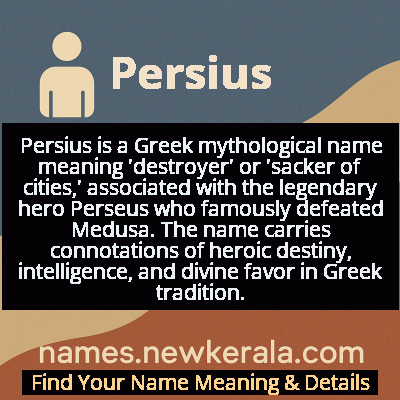Persius Name Meaning & Details
Origin, Popularity, Numerology Analysis & Name Meaning of Persius
Discover the origin, meaning, and cultural significance of the name PERSIUS. Delve into its historical roots and explore the lasting impact it has had on communities and traditions.
Name
Persius
Gender
Male
Origin
Greek
Lucky Number
8
Meaning of the Name - Persius
Persius is a Greek mythological name meaning 'destroyer' or 'sacker of cities,' associated with the legendary hero Perseus who famously defeated Medusa. The name carries connotations of heroic destiny, intelligence, and divine favor in Greek tradition.
Persius - Complete Numerology Analysis
Your Numerology Number
Based on Pythagorean Numerology System
Ruling Planet
Saturn
Positive Nature
Ambitious, efficient, realistic, and authoritative.
Negative Traits
Materialistic, stressed, confrontational, and can be overly ambitious.
Lucky Colours
Dark blue, black.
Lucky Days
Saturday.
Lucky Stones
Blue sapphire, amethyst.
Harmony Numbers
2, 4, 6.
Best Suited Professions
Business leaders, managers, financial services, law enforcement.
What People Like About You
Leadership, determination, organizational skills.
Famous People Named Persius
Perseus of Macedon
Ancient Ruler
Last king of Macedon before Roman conquest
Aulus Persius Flaccus
Roman Poet
Renowned Stoic poet and satirist
Persius the Astronomer
Greek Astronomer
Early celestial observations and astronomical contributions
Name Variations & International Equivalents
Click on blue names to explore their detailed meanings. Gray names with will be available soon.
Cultural & Historical Significance
The name Persius specifically gained prominence in Roman culture through Aulus Persius Flaccus, a respected Stoic poet of the 1st century AD. This connection bridges Greek heroic traditions with Roman philosophical thought, creating a name that represents both action and contemplation. Throughout the Renaissance and classical revival periods, the Perseus myth experienced renewed interest, inspiring countless artworks, literary works, and operas. The name thus carries a dual heritage of heroic action from Greek tradition and intellectual depth from Roman Stoicism, making it a symbol of the complete classical ideal—the warrior-philosopher who combines physical prowess with mental acuity.
Extended Personality Analysis
Individuals bearing the name Persius are typically characterized by a unique blend of heroic determination and intellectual depth. They often exhibit natural leadership qualities, combined with a strategic mind that allows them to navigate complex situations with foresight and precision. Like their mythological namesake who outsmarted Medusa, Persius-named individuals tend to be resourceful problem-solvers who prefer clever solutions over brute force. There's an inherent nobility in their demeanor, often accompanied by a strong sense of justice and moral conviction that guides their actions and decisions.
Beyond their practical capabilities, those named Persius frequently possess a philosophical or contemplative side, showing interest in deeper questions about life, purpose, and human nature. This combination makes them well-rounded individuals who can both act decisively in challenging situations and reflect meaningfully on their experiences. They tend to be loyal to their principles and to those they care about, while maintaining the courage to stand against adversity. Their personality often inspires confidence in others, as they project an aura of competence and integrity that makes them natural leaders in both professional and personal contexts.
Modern Usage & Popularity
In contemporary naming practices, Persius remains an uncommon but distinguished choice that appeals particularly to parents with interests in classical literature, mythology, or history. While it doesn't rank on mainstream baby name charts, it maintains a steady presence among families seeking names with intellectual and historical gravitas. The name has experienced a mild resurgence in recent decades, partly influenced by the popularity of mythological names and media franchises like the Percy Jackson series, which features a modernized version of the Perseus legend. It's especially favored in academic, literary, and artistic circles where classical references are valued. The name's rarity contributes to its elite appeal, making it a choice for parents who want a unique but meaningful name with strong classical foundations and heroic connotations.
Symbolic & Spiritual Meanings
Symbolically, Persius represents the eternal human quest to overcome seemingly impossible challenges through intelligence, courage, and divine guidance. The name embodies the archetype of the hero's journey—from humble beginnings to triumphant destiny—symbolizing transformation and the realization of potential. It carries connotations of light overcoming darkness, as Perseus used reflection and cunning to defeat the monstrous Medusa. The name also symbolizes the balance between mortal limitations and divine aspirations, representing humanity's capacity to achieve greatness while remaining grounded in ethical principles. In a broader metaphorical sense, Persius signifies the victory of order over chaos, intelligence over brute force, and hope over despair, making it a powerful symbolic name for those who value classical virtues and heroic ideals.

